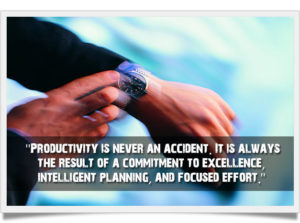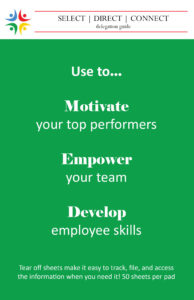Time management is one of those concepts that many leaders agree is important but fewer put into practice. One reason is that leaders are so busy being busy they don’t make time to think about what’s important.
Maximum productivity is a critical leadership function that requires careful use of the only non-renewable resource under a leader’s control: time.
Money, people, equipment, and tools are all resources that can be replenished. Once time is gone, it’s gone. There’s no getting it back.
The most effective leaders also seem to the best at time management.
3 Steps for Maximizing Productivity
Ask
Each morning ask yourself this question: What’s the one most important thing I need to do today?
Your one most important thing could be related to any one of the 7 slices of life covered in Focused Action for BIG Results… financial, family, work, health, personal development, community service, or recreation.
Every action you take throughout the day should support your achievement of that one most important thing.
If your one most important thing is to have dinner with your family, every action you take should help ensure you get out of work on time so you can achieve your most important thing.
Dump
Obviously, you have many other things you need to do each day besides the one most important thing. In order to clear your head and maintain focus, do a brain dump and list all your to-do’s on a piece of paper or use an app.
Trying to keep all your to-do’s in your head is a recipe for stress and fatigue. You can’t really give any other task your full attention when you’re trying to keep track of all the tasks you need to do throughout the day.
Get it out of your head and onto paper to give yourself peace of mind.
Assign
Give each task on your list a priority ranking – high, medium, low.
High priority items are both urgent and important. These could include tasks that are due today, client crises, or employee issues that must not be delayed. Nope, you can’t put off that difficult conversation with your problem employee.
Medium tasks are necessary but not urgent. Think of your normal daily activities… coaching, recognition, and tracking productivity to name a few.
Low priority items are things that don’t add value to the bottom line. Some meetings, some phone calls, some conversations.
Work on the high priority items first.
Create Good Habits
Good time management comes down to creating good habits. Get in the habit of checking in with yourself frequently throughout the day and asking yourself this question: Is what I’m doing right now helping me achieve my long-term goals?
The truth is that achieving long-term goals isn’t always easy. It requires consistent action even when you don’t feel like it. Check out the method Jerry Seinfeld used to hone his skills and become a successful comedian.
The Seinfeld Method
There’s a story about a new comedian who asked Jerry Seinfeld for some career advice. Seinfeld shared the secret to his success. He said that to be a better comic he had to write better jokes and in order to create better jokes he had to write every day.
To track his progress, he hung a large year-at-a-glance calendar on his wall and marked a big red X on the calendar every day that he wrote jokes. With each X, he created a chain of X’s that grew day after day. He said the secret to his success was to not break the chain. He knew that if he invested time each day in the mundane task of creating better jokes he would eventually become a better comic. That’s exactly what happened.
The Most Underused Productivity Tip
Leaders should do the tasks only they should do and delegate the rest.
What tasks should a leader focus on? Tasks that:
- Improve quality
- Increase productivity
- Maximize efficiency
The only tasks that are off-limits for delegation are: discipline, recognition, and performance feedback. Everything else is on the table.
The first step to delegation is to identify the task. Start by making a list of all the tasks you do on a daily basis. The easiest way to do this is to carry a notepad around for a few days and jot down the tasks as you’re doing them.

Once you have your list, honestly review it to see which tasks you absolutely must do and which ones you can delegate to others. Get Communicate Like a Boss: Everyday Leadership Skills That Produce Real Results to learn the rest of the steps to successful delegation and use the Select | Direct | Connect delegation guides for the best results.
Mastering the art of time management isn’t easy but by practicing a few habits, it’s a skill that can be developed.
Liz Uram works with leaders to get better results through clear communication. Download the C.O.R.E. Feedback Formula to give conflict-free performance feedback.
